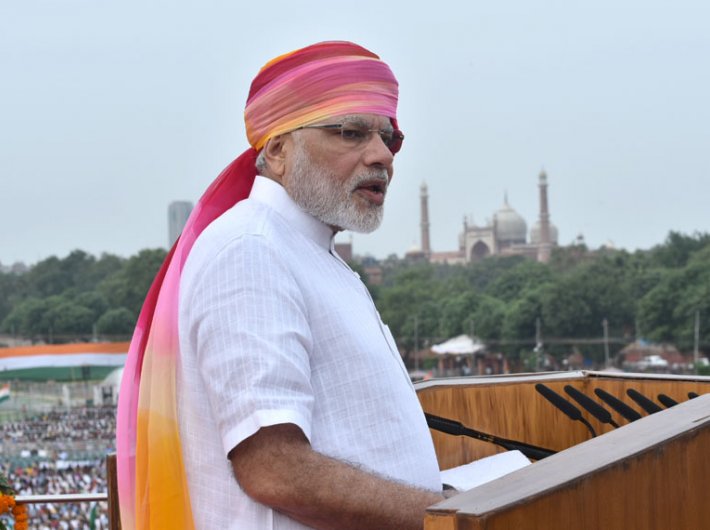PM’s Independence Day speech has dramatically changed the narrative in south Asia
A combative Narendra Modi on August 15 prised open the fault lines within Pakistan, touching upon Balochistan and Pakistan Occupied Kashmir (POK) in a move that will definitely leave Islamabad squirming.
India has perhaps for the first time taken the high ground and forced Pakistan on to its back foot, which signals New Delhi’s intent to pursue an aggressive line. Having seen India pursue a non-provocative approach to its exceedingly difficult neighbour over all these years, the Independence Day speech will go down well with all those who have been wanting a more muscular approach.
The reference particularly to Balochistan seems to have been well thought out. Balochistan covers a staggering 347,190 sq km and is Pakistan’s largest province, constituting 44 percent of the country's total land mass. The province borders two countries – Afghanistan to the north and north-west and Iran to the south-west. The Balochistan conflict is a guerrilla war waged by Baloch nationalists who want greater autonomy and increased royalties from natural resources and provincial revenue – and some want nothing less than an independent nation-state.
A day after Modi’s speech, Pakistan’s The News International said in an editorial on Tuesday: “The trouble is that both countries are in no mood for diplomacy at the time. The other country is available as a readymade excuse in the face of both India and Pakistan’s failure to deal with serious issues within their own territories. What is more troubling is the possibility that the diplomatic war of words could translate into another extended period of firing across the LoC.”
It went on to add that Modi, “ever the hawk, went much further in his August 15 speech. In an extraordinary diatribe, he condemned Pakistan as a supporter of terrorism and said he had been thanked a lot by the people of Balochistan, Gilgit and what he referred to as Pakistan-occupied Kashmir. These thanks Modi has received are surely a figment of his imagination but reveal a lot about how he views Pakistan… In the end, all this anger is merely posturing and cannot resolve Kashmir or any other issues between Pakistan and India. It is time for empty posturing and empty shelling to be rooted out of our regional politics.”
But what Modi said is not new. His predecessor Manmohan Singh and the then Pakistan prime minister Yousaf Raza Gilani had met on the sidelines of a Non-Aligned Movement summit in the Egyptian resort of Sharm el-Sheikh in July 2009 and the joint statement had said: “Prime Minister Gilani mentioned that Pakistan has some information on threats in Balochistan and other areas.”
That one line caused uproar in India. The opposition then, including the BJP, had described it as a sell-out. During the Lok Sabha debate, top BJP leader LK Advani had said: “For the first time in last 60 years have we issued such a statement. If they got Balochistan in, why did we not add our point of view in the statement? This is our objection. I fully agree with the views of my colleague Yashwant Sinha that the mention of Balochistan in the joint statement will haunt the country for a long time to come.”
Seven years later, the reference to Balochistan is now being interpreted as assertiveness. This is what Modi said on August 15: “Today from the ramparts of Red Fort, I want to greet and express my thanks to some people. In the last few days, people of Balochistan, Gilgit, Pakistan Occupied Kashmir have thanked me, have expressed gratitude, and expressed good wishes for me. The people who are living far away, whom I have never seen, never met – such people have expressed appreciation for Prime Minister of India, for 125 crore countrymen. This is an honour for our countrymen.”
In a way, for some time, this will shift the focus away from Kashmir which has been burning since July 8, when militant Burhan Wani was killed. Over 50 people have been killed in the ensuing violence. Modi has neatly lobbed the ball into Pakistan’s court and forced them to deal with a completely new scenario in which New Delhi too will not hesitate to call a spade a spade.
That is a huge difference and that should worry Pakistan, which for decades had practically a free run, raising the Kashmir issue whenever and wherever it wanted. Now, the tables have turned, with India showing a mirror to Pakistan.
China too must be closely watching as this message is not just alone for Pakistan, but also for Islamabad’s all-weather friend Beijing.
What New Delhi does next will decide how this fresh narrative pans out. Now that Modi has put into words, what many have felt for years, it is sure to find political resonance within the country.
The Congress has been quick to understand its political significance. AICC spokesman Randeep Surjewala said that "whether it is Balochistan or POK or other parts of Pakistan, there are violations being committed by Pakistani agencies and armed forces. The Congress feels the violations in Balochistan, the way democracy and democratic dissent is being stifled, India should raise it in bilateral and international fora". The Congress is seemingly trying to go with the popular mood.
For years, India has endured Pakistan’s constant interference, now perhaps it is time that Islamabad knows it needs to set its own house in order before peeping into the neighbour’s yard.

